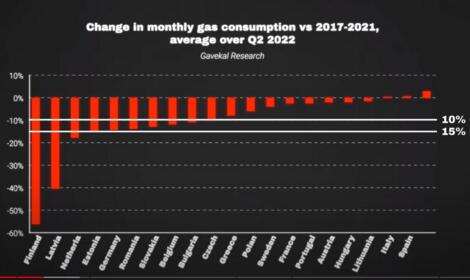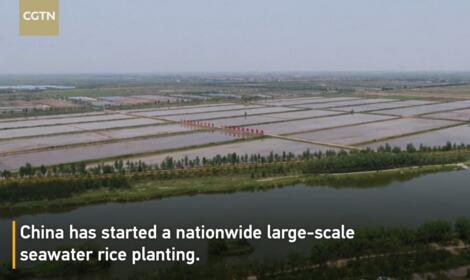QA问答:我的邻居在冬天把盐撒在他们的车道上,这最终将进入湖泊,并危害水生生物。如果我晚上把它扫走,我会被追究责任吗?
正文翻译

My neighbors put salt on their driveway in the winter which is going to end up in lakes and harm the aquatic life. If I sweep it away at night can I be held liable?
我的邻居在冬天把盐撒在他们的车道上,这最终将进入湖泊,并危害水生生物。如果我晚上把它扫走,我会被追究责任吗?

My neighbors put salt on their driveway in the winter which is going to end up in lakes and harm the aquatic life. If I sweep it away at night can I be held liable?
我的邻居在冬天把盐撒在他们的车道上,这最终将进入湖泊,并危害水生生物。如果我晚上把它扫走,我会被追究责任吗?
评论翻译
Richard Talbot
Let’s forget about the legal ramifications of the whole scenario and let’s focus on the practicality of it all.
If you “sweep it away” (your words, not mine), it will still end up in the lakes and rivers. Why? Because rock salt breaks down and “melts” away, no matter what outdoor surface it is on, not just a driveway.
But even if you sweep it up instead of away, where would you put it? In the trash? And where do you think that rock salt is going to end up? Do you think trash just vanishes off the face of the earth once the garbage man picks it up every week? Do you think that garbage trucks are magic vehicles that somehow make trash disappear?
让我们忘掉整个场景的法律后果,让我们专注于它的实用性。
如果你“把它一扫而光”(这是你的原话,不是我的),它仍然会进入湖泊和河流之中。为什么?因为盐不管是在车道,还是在室外的什么地方,它都会分解并“融化”掉。
即使你把它扫起来而不扔掉,你会把它放在哪里?垃圾桶里?你认为盐最终会去哪里?你认为收拾垃圾的人,每周捡一次垃圾,垃圾就会从地球上消失吗?你认为垃圾车是神奇的交通工具吗?
Look, let’s be frank here - you are not really an environmentalist. You simply want to be due to social pressure, but you don’t actually have the capacities to actually be one (as is the case with most self-proclaimed environmentalists). In other words, you are like that little child who dresses up in their mother’s or father’s clothing pretending to be an adult - the clothing does not make them an adult, they are still children underneath those adult clothes. In the case of a child, it’s cute. But in your case, not so much.
听着,坦率地说,你不是真正的环保主义者。你只是迫于社会压力,但实际上你没有能力成为一个真正的人(大多数自称环保主义者就是这样)。换言之,你就像一个小孩,穿着父母的衣服,假装自己是一个成年人——这件衣服并不能让他们成为一个成年人,他们仍然是穿着成人衣服的孩子。对于孩子来说,这很可爱。但你的情况,并不可爱。
Peter Kruger
All right, down to seriousness.
It’s not just that you can be held liable. It’s more of a question of all the various ways you pretty much will be held liable.
Trespass
First, if you did this, you’d be trespassing on your neighbor’s property. Trespass has three basic elements: 1) the plaintiff has a possessory interest in the land, 2) the defendant intentionally was present on the property (or if unintentionally, did not immediately leave the premises) and 3) the defendant caused some damage to the property while there.
Congrats, you’ve checked all the boxes!
Your neighbor owns or rents the property and therefore has a right to possess it. You were intentionally present on the property. And though it may not seem like damaging the property to you, you removed something that the neighbor placed on it - that’s legally damage to the property.
So, you’re liable for a trespass. That often comes with double or treble damages in many jurisdictions. If you did it flagrantly enough or repeatedly, you could even be liable for punitive damages in some places.
好吧,认真点。
你不仅仅要承担责任,而且,你将以各种方式承担责任。
非法侵入:
首先,如果你这样做,你就会侵占你邻居的财产。非法侵入有三个基本要素:1)原告在土地上拥有占有权益,2)被告故意存在于该房产上(或如果无意,没有立即离开该房产),3)被告在那里对房产造成了一定的损害。
恭喜你,三项你都符合。
您的邻居拥有或租赁该房产,因此有权拥有该房产。您是故意出现在该房产上的。虽然这对你来说可能不像是破坏财产,但你移除了邻居放在上面的东西——这是对财产的破坏。
所以,你要对侵犯行为负责。在许多司法管辖区,这往往会造成双倍或三倍的损害。如果你公然或多次这样做,你甚至可能在某些地方承担惩罚性赔偿责任。
Negligence
Second, if you did this and anyone slips and falls on the ice, you’re going to be liable for negligence.
Negligence has five basic elements: 1) you owed a duty of care to the plaintiff, 2) you breached that duty, 3) your actions put the plaintiff in the “zone of danger,” thereby proximately causing their injury, 4) your actions directly caused the injury, and 5) the plaintiff was actually injured.
At a minimum, you owe everyone around you a duty of reasonable care. That duty of reasonable care, especially in the winter, would be to not contribute to hazardous conditions.
You also owe a duty to your neighbor not to interfere with his reasonable use of the property. Most state statutes (not to mention homeowner policies) require individuals to keep their property safe for people to come on. This generally includes keeping places like driveways reasonably free of ice and snow in the winter to avoid slip-and-fall incidents. Thus, you owe a duty not to cause him to violate his duty.
You breached that duty by sweeping away the salt that keeps the driveway free of ice.
疏忽:
第二,如果你这样做了,任何人滑倒在冰上,你将承担过失责任。
过失责任有五个基本要素:1)你对原告负有照顾义务,2)你违反了该义务,3)你的行为将原告置于“危险区”,从而造成他们受到伤害,4)你的行动直接造成了伤害,5)原告实际上受到了伤害。
至少,你对周围的每个人都负有合理的照顾义务。合理照顾的义务,特别是在冬天,是不造成危险条件。
你也有义务不干涉你的邻居对财产的合理使用。大多数州法规(更不用说房主政策)都要求个人保护自己的财产安全。这通常包括在冬季保持车道等地方合理无冰雪,以避免滑倒事故。因此,你有责任不让他违反他的职责。
你违反了这一义务,把保持车道不结冰的盐扫走了。
Your actions, especially in doing it covertly so that the neighbor wouldn’t know you swept away the salt, puts people in the zone of danger because ice could accumulate and the neighbor wouldn’t know that he needed to do something about it (thinking he already had).
But-for your actions in removing the salt, arguably, that person would not have slipped and fallen.
And if they decide to sue, it’s because they’re injured.
Your insurance won’t cover you here, because this is someone else’s property, not yours, and you weren’t an invitee or anything. You’re a trespasser on someone else’s property. So, be prepared to pay out the pocket for this.
你的行为,尤其是在暗中做,让邻居不知道你扫走了盐,会让人们处于危险地带,因为冰可能会积聚,而邻居不知道他需要采取措施(他认为他已经这样做了)。
如果没有你的行动,可以说,那个人不会滑倒。
如果他们决定起诉,那么他们是因为你受伤了。
你的保险不会在这里覆盖你,因为这是别人的财产,不是你的,你也不是受邀者或其他人。你侵犯了别人的财产。所以,准备为此付出代价。
Conversion of Chattel
This one’s a little squishier. Conversion of chattel is basically the civil version of larceny.
Conversion has three elements: 1) there was an intent to interfere with the lawful owner’s control over their property, 2) you exercised “substantial dominion” over that property, and 3) any damage was not accidental (but this only applies if you had permission to use the property).
Chattel here refers to personal property. In this case, the salt would be considered the chattel.
You definitely intended to interfere with the lawful owner’s control over that property, because you sure as heck didn’t just accidentally sweep away that salt when you slipped and fell. You got up, in the middle of the night, swept up that salt, and took it away. You did it on purpose.
动产的转换:
这个有点站不住脚。动产转换基本上是盗窃罪的民事版本。
转换有三个要素:1)意图干扰合法所有者对其财产的控制;2)您对该财产行使了“实质支配权”;3)任何损害都不是偶然的(但这仅适用于您获得使用该财产许可的情况)。
这里的动产是指个人财产。在这种情况下,盐将被视为动产。
你肯定是想干涉合法所有者对该财产的控制,因为你肯定不是在滑倒时不小心把盐扫走了。你半夜起来,把盐扫干净,拿走了。你是故意的。
Second, you definitely exercised “substantial dominion” over that property. This can be a little squishy, but your control over it was probably meant to be permanent and deprived the owner of its use. If you just took the salt and dumped it back into a salt bin in the garage, that might make the damage less, but that’s about it. If you took it permanently and disposed of it, the extent and duration of the control certainly meets this element.
The third element doesn’t apply because you didn’t get permission.
So, you’re liable for conversion.
第二,你确实对该财产行使了“实质支配权”。这可能有点站不住脚,但你对它的控制可能是永久性的,并剥夺了所有者的使用权。如果你只是拿了盐,然后把它倒回车库里的盐箱里,这可能会减少损害,但这就是问题所在。如果你把它永久性地拿走并处理掉,那么控制的范围和持续时间肯定符合这一点。
第三个元素不适用,因为您没有获得许可。
所以,你负有转换动产的责任。
Wrongful Death
This would be your worst-case scenario. You take the salt off the driveway, and the next morning, your neighbor comes out to get the morning paper, slips and falls, takes one on the chin, cracks open his skull, and bleeds out on the pavement before his now-widow and five-year-old child come outside to play in the fresh snow and stumble over his cooling corpse in the driveway.
The elements of wrongful death are 1) a person died, 2) you negligently caused the death or intentionally tried to harm the deceased which lead to that death, 3) the survivors of that deceased have suffered monetary injury at the loss. In some states, there’s a requirement of the appointment of a personal representative of the estate.
If you take a little of the analysis from above and your neighbor was the sole income for the family, you could be looking a judgment of hundreds of thousands if not millions of dollars (depending on how young the neighbor was). You’re utterly screwed here. Juries will nail you to the wall on this. You put property over life. There’s virtually no way you won’t be held liable, and you’ll be lucky to get away with a settlement here.
不当死亡:
这将是你最坏的情况。你把盐从车道上拿走,第二天早上,你的邻居出来拿晨报,滑倒了,下巴摔在地上,头骨裂开了,在他现在的寡妇和五岁的孩子出来外面玩新鲜的雪,在车道上被他冰冷的尸体绊倒之前,他在人行道上流血。
不当死亡的要素包括:1)一个人死亡,2)你疏忽造成死亡,或故意伤害死者导致死亡,3)死者的未亡人因此而遭受金钱伤害。在一些州,需要任命遗产的个人代表。
如果你从上面确定了一点,你的邻居是这个家庭唯一的收入来源,那么你可能需要支付数十万美元(如果不是数百万美元)的判决(取决于邻居的年龄)。你彻底完蛋了。陪审团会把你钉在墙上的。你把财产置于生命之上。事实上,你不可能不承担责任,你很幸运能在这里达成和解。
Bonus: Tortious Interference with a Contract
If the neighbor hires a company to come out and take care of snow removal, you could be looking at tortious interference with a contract.
Tortious interference requires 1) the existence of a contract, 2) the tortfeasor’s knowledge of that contract, 3) the tortfeasor’s intentional procurement of breach of that contract, 4) a lack of justification on the part of the tortfeasor, and 5) damages from the breach of the contract.
If you know that they use a service, you are aware of the contract and one exists. You are procuring breach of that contract, because you’re interfering with the service’s ability to keep the driveway clear of ice and snow. If anyone gets hurt, or the neighbor has to keep calling the service out over and over to keep the driveway clear and it’s more than they otherwise would have, that’s damages, and you probably aren’t going to pass the smell test to the court or jury on reasonable justification.
意外收获:对合同的恶意干涉
如果邻居雇佣了一家公司来负责除雪,你可能会看到合同中的侵权行为。
侵权干涉需要1)合同的存在,2)侵权人对该合同的了解,3)侵权人故意违反该合同,4)侵权人缺乏正当理由,以及5)违约造成的损害。
如果你知道他们使用了一项服务,你就知道该合同存在。你违反了合同,因为你干扰了服务部门保持车道上没有冰雪的能力。如果有人受伤,或者邻居不得不一遍又一遍地叫停服务,以保持车道畅通,而这比他们本来应该做的多得多,那就是损害,而且你很可能无法通过法庭或陪审团的检验。
Are there any defenses?
Probably not.
The only way you could walk away with zero liability is if this is a public necessity.
You have to prove three things to get away with public necessity as a defense here: 1) you had a reasonable belief that your action was necessary for the greater good, 2) the action was reasonable and not excessive, and 3) it put protecting life over protecting property.
You’ve got an uphill battle on all three.
有什么防御措施吗?
可能没有。
如果这是公共必需品的话,你就可以不承担任何责任。
在这里,你必须证明三件事才能将公共必要性作为辩护:1)你有合理的信念,认为你的行为是为了更大的利益所必需的;2)这种行为是合理的,并不过分;3)它将保护生命置于保护财产之上。
你在这三方面都有一场艰苦的战斗。
You might very well believe that your action was necessary for the greater good, but I doubt most juries are going to find that reasonable. The salt off of one driveway compared to the tons being dumped on the roads, bridges, commercial parking lots, and everything else is literally a grain of sand off a beach.
You’re going to be hard-pressed to convince a jury that your action was reasonable and not excessive. This will almost always apply a cost-benefit analysis here, and the cost of creating unsafe conditions for your neighbor, especially doing it covertly in the middle of the night, pales in comparison to the benefit of sweeping clean two pounds of salt from the waterways. This is worse if the neighbor is using a more environmentally friendly ice-melter such as calcium or magnesium chloride rather than sodium chloride. NaCl based ice-melters are the ones that cause more problems. Magnesium chloride is much more plant-safe.
你很可能相信你的行为是为了更大的利益所必需的,但我怀疑大多数陪审团会认为这是合理的。与倾倒在道路、桥梁、商业停车场和其他一切上的盐相比,一条车道上的盐简直就是海滩上的一粒沙子。
你很难说服陪审团你的行为是合理的而不是过分的。这几乎总是适用于成本效益分析,相比对你的邻居造成的不安全环境,从水道中清除两磅盐的好处显得微不足道。尤其你还是在半夜偷偷地这样做。如果邻居使用更环保的融冰器,如氯化钙或氯化镁,而不是氯化钠,情况会更糟。基于氯化钠的融冰器可能导致更多问题,而氯化镁对植物更安全。
Third, you’re going to have a difficult time claiming that this puts life over property again. While you might consider the frogs and sloths orangutans and fruit-bats to be life, within the meaning of the law, it’s other humans. Your actions put other humans at risk far more directly than your neighbor’s use of salt.
So, your defenses are very, very thin.
But wait! There’s more! Because while we might have gotten through with civil liability, there’s also possible criminal liability!
Criminal Trespass
Pretty much the same as civil trespass. Depending on the damage caused, this is probably a misdemeanor. Expect a fine, but probably not jail time.
第三,你将很难声称这是将生命置于财产之上。虽然你可能认为青蛙、树懒、猩猩和果蝠是生命,但在法律的意义上,他们不是人类。你的行为比你邻居使用盐更直接地给其他人带来危险。
所以,你的辩解非常非常薄弱。
但是等等!还有更多!因为虽然我们可能已经承担了民事责任,但也可能需要承担刑事责任!
非法侵入犯罪:
与民事侵犯几乎相同。根据造成的损害,这可能是轻罪。期待只是罚款,可能不会坐牢。
Theft or Larceny
This is similar to conversion. Larceny has four elements: 1) you took and carried away 2) the property of another, 3) without their consent, 4) with intent to deprive the owner of the property permanently.
If you just swept up the salt and very, very carefully put it back in a bin, you miiiiight get away with avoiding element 1. But if you sweep it up and toss it in the trash? You took and carried away that property. It didn’t belong to you, it belonged to your neighbor. Your neighbor didn’t consent, because you’re doing it covertly and not asking permission. And you definitely intended to deprive them permanently of the salt if you toss it away in the trash.
Again, depending on the value of the salt, probably a petty misdemeanor. You can expect a fine, but probably not jail time.
盗窃或偷盗:
这与动产转换类似。盗窃有四个要素:1)你拿走并带走了 2)他人的财产;3)未经他人同意;4)意图永久剥夺所有者的财产。
如果你刚刚把盐扫干净,非常非常小心地放回箱子里,你可能会避开第1元素。但如果你把它扫起来扔进垃圾桶?你拿走了财产。它不属于你,它属于你的邻居。你的邻居没有同意,因为你是在秘密地做,没有征得同意。如果你把盐扔到垃圾桶里,你肯定打算永久剥夺他们的盐。
同样,根据盐的价值,可能是轻微的轻罪。你可以期待罚款,但可能不会坐牢。
In short, yeah, you’re probably gonna be liable. It’s more of a question of for what and for how much.
Don’t mess with your neighbor’s stuff.
If you think they’re putting down too much, chat with them about your environmental concerns.
简而言之,是的,你可能要承担责任。这更多的是承担什么责任,承担多少的问题。
不要乱动邻居的东西。
如果你觉得他们放得太多,就和他们谈谈你对环境的担忧。
Disclaimer:
This answer is not a substitute for professional legal advice. This answer does not create an attorney-client relationship, nor is it a solicitation to offer legal advice. If you ignore this warning and convey confidential information in a private message or comment, there is no duty to keep that information confidential or forego representation adverse to your interests. Seek the advice of a licensed attorney in the appropriate jurisdiction before taking any action that may affect your rights. If you believe you have a claim against someone, consult an attorney immediately, otherwise there is a risk that the time allotted to bring your claim may expire.
免责声明:
这个答案不能代替专业的法律建议。这一回答并不构成律师与客户的关系,也不构成提供法律建议的请求。如果您忽略此警告并在私人信息或评论中传达机密信息,则没有义务对该信息保密或放弃对您的利益不利的陈述。在采取任何可能影响您权利的行动之前,请咨询相应司法管辖区的执业律师。如果你认为你有针对某人的索赔,请立即咨询律师,否则,提出索赔的时间可能会过期。
Jason Stover
Morality sure is a funny thing isn't it? You feel so triggered by the salt on your neighbor's driveway you will violate their personal property and invade their land to potentially bring harm to them. Never once asking if it's morally right to press your beliefs onto your neighbor and invade their land. Salt (as you can fully Google) is derived from 100% natural sources. Furthermore its presence in a store means it will end up used either by your neighbor or someone else. As another aside, the snow melted and gutter water will further dilute that salt long before it reaches a level that could harm anything. Finally its effects on the environment are studied in dozens of research documents that concluded there was an unclear lix to any environmental harm. However! Your actions will have an immediate and measurable harm to your neighbors property and could without question lead to serious or fatal injury. Considering all of that I am certain that if a person can willingly bring harm to their neighbor or their neighbors family in the name of marginal and only slightly potential hypothetical environmental protection then I am certain that a quora answer wont change such a mind.
道德确实是一件有趣的事情,不是吗?你觉得被邻居车道上的盐触动了,你想侵犯他们的个人财产,侵犯他们的土地,从而可能给他们带来伤害。永远不要问,把你的信仰强加给你的邻居,侵犯他们的土地,这在道德上是否正确。盐(正如你完全可以在谷歌上看到的)来源于100%的自然资源。此外,它在商店中的存在意味着它最终会被你的邻居或其他人使用。另一方面,积雪融化和雨水将进一步稀释盐分,直到盐分达到不可能危害任何东西的水平。最后,数十份研究文件对其对环境的影响进行了研究,得出的结论是,与任何环境危害都没有明确的联系。然而你的行为会对你的邻居财产造成直接和可衡量的伤害,毫无疑问会导致严重或致命的伤害。考虑到所有这些,我确信,如果一个人愿意以边缘的、仅具有轻微潜在的假设环境保护为名,给邻居或邻居家庭带来伤害,那么我确信,一个简单的答案不会改变这种想法。
Jim Plunkett
I’m also a strong environmentalist and share your concern, but it is definitely misplaced.
Attorneys have provided answers about your multiple forms of liability and why it is a bad idea.
I also used to enjoy alpine ski racing, and in that sport, in order to harden the surface of the racecourses to reduce deterioration, the courses are heavily salted multiple times. This causes the snow to melt and refreeze to form a harder iced surface, which reduces the tendency to form dangerous ruts, keeping the racing more safe and fair (for those who start later). The amounts of salt used vastly exceed any driveway use.
Many skiers, including me, are also environmentally conscious, and especially in ski areas in national parks and other sensitive areas, wondered about this practice. It turns out that there were studies done in some of the national parks, between salt, fertilizer (which has a similar effect) and no salt. It turns out they could detect NO DIFFERENCES whatsoever in the flora or fauna in the salted/fertilized areas.
The scientific result was that the effect is too small to change anything, The amount of snow and rain dilutes the salt/fertilizer so much that the plants and microbes never see a difference. I do not have a reference to the study, but that is to the best of my recollection, it was done in Oregon.
So, not only are you putting people at risk, putting your own liability at risk, you would be entirely wasting your time to do this.
我也是一个激烈的环保主义者,和你一样担心,但这绝对是错误的。
律师已经就你的多种责任形式以及为什么这是一个坏主意提供了答案。
我过去也喜欢高山滑雪比赛,在这项运动中,为了硬化赛道表面以减少恶化,赛道多次被大量加盐。这会导致雪融化并重新冻结,形成更坚硬的冰面,从而减少形成危险车辙的趋势,从而使比赛更加安全和公平(对于较晚开始的人来说)。盐的使用量大大超过了车道的使用量。
包括我在内的许多滑雪者也有环保意识,尤其是在国家公园的滑雪区和其他敏感地区,他们对这种做法感到好奇。事实证明,在一些国家公园里进行了关于盐、肥料(有类似的效果)和不含盐的研究。事实证明,他们在盐渍/施肥区的动植物中没有发现任何差异。
科学的结果是,这种影响太小,无法改变任何事情。雪和雨的量会稀释盐/肥料,以至于植物和微生物都看不出有什么不同。我没有做过这项研究,但据我所知,这项研究是在俄勒冈州进行的。
所以,你不仅让人们处于危险之中,而且让你自己的责任处于危险之中。你这样做完全是在浪费时间。
Caroline Bentley Page
So your idea is to sweep it away from their driveway and that will save aquatic life and lakes? Where are you going to put it? Can’t be on the ground, because anything on the ground that breaks down in water will end up in local waterways. I know, pile it up on your roof! That’ll keep it out of … wait, that won’t work because rain, you silly person.
所以你的想法是把它从他们的车道上扫走,这样可以拯救水生生物和湖泊?你打算把它放在哪里?不能在地面上,因为地面上任何在水中分解的东西都会进入当地的水道。我知道,把它堆在你的屋顶上!那会让它远离…等等,那不会起作用,因为会下雨,你这个愚蠢的人。
Lynn Adams
While I understand your concern for the environment, I would caution you that you can, indeed, face a number of charges for what you wish to do.
虽然我理解你对环境的担忧,但我要提醒你,你确实可能因为你想做的事情而面临多项指控。
Edward Brain
Sorry, I have absolutely no sympathy for what you want to accomplish. I have slipped and fallen on black ice and injured myself. Anything someone does to make sure this does not happen to them or to anyone else will be supported by me - and salt is the preferred method of doing so and it works very well.
However, I guess you would want to remove the salt that I would put down on MY PROPERTY and/or property that I am responsible for keeping clear.
If I caught someone removing the salt that I put down, I would first talk to the person and explain that I do not with to be INJURED AGAIN and that they have no right whatsoever to remove the salt that I put down.
对不起,我对你想实现的目标毫无同理心。我滑倒在冰上,受伤了。任何人为了确保这件事不会发生在他们或其他人身上而做的事情都会得到我的支持——盐是最好的方法,而且效果很好。
然而,我想你会想要去除我将放在我的财产和/或我负责清理的财产上的盐。
如果我发现有人拿走了我放下的盐,我会先和那个人谈谈,并解释我不想再受伤,他们无权拿走我放下的盐。
If it occurred again, I would call the police - and I would insist that you be charged for your ciminial behaviour, which includes:
Trespassing. You are on my property and have no right to be there.
Mischief. You are intentionally doing something that you know may cause someone to be hurt.
Assault. By removing the salt, you risk causing my to fall and injury myself. That can be considered assault.
Yes, there are more ‘eco-friendly’ options, but salt is still the cheapest option as so you do not have the right to remove it just because you don’t like others using it.
Also, I could have a restraining order taken out on you to keep you away from my property. And that has legal consequences as well if you break the restraining order.
So, please don’t be foolish and start removing salt from other people’s property. It isn’t worth the legal ramifications and the potential injuries that you could cause.
如果再次发生这种情况,我会报警,我会坚持要求你对你的犯罪行为负责,包括:
1、非法入侵。你在我的财产上,你无权在那里。
2、伤害。你在故意做一些你知道可能会伤害某人的事情。
3、攻击。通过去除盐,你可能会导致我摔倒并受伤。这可以被视为攻击。
是的,有更多“环保”的选择,但盐仍然是最便宜的选择,因为你没有权利仅仅因为你不喜欢别人使用它而去除它。
此外,我可以对你下达限制令,让你远离我的财产。如果你违反了限制令,这也会产生法律后果。
所以,请不要傻了,不要从别人的财产中拿走盐。这不值得你承担法律后果和产生可能造成的伤害。
Trevor Young
You realize that sweeping it off the driveway and onto the grass won't prevent it getting into the lakes, right?
If anything, your actions result in MORE salt getting into the lakes. Your neighbors are just going to put more salt on their driveway. By sweeping it off, you are essentially doubling the amount of salt that ends up in the lakes.
Also, you can be arrested for trespassing and criminal mischief.
Mind your own business, Karen.
你知道把它从车道上扫到草地上不会阻止它进入湖泊,对吧?
如果这样的话,你的行为会导致更多的盐进入湖泊。你的邻居只会在他们的车道上撒更多的盐。通过清除它,你基本上是将最终进入湖泊的盐量增加了一倍。
此外,你还可能因非法侵入和刑事伤害而被捕。
别管闲事,凯伦。
Michael Iontton
I genuinely couldn't keep a straight face reading this. I don't know whether you're being serious.
Also, the water cycle is a thing that exists.
There is more salt in the soil the rivers run through than try he salt your neighbour put on their drive.
You sound like a neighbour from hell.
我真的无法直视这篇文章。我不知道你是不是认真的。
此外,水循环是存在的。
河流流经的土壤中的盐比你邻居在路上撒的盐还要多。
你听起来像一个来自地狱的邻居。
Let’s forget about the legal ramifications of the whole scenario and let’s focus on the practicality of it all.
If you “sweep it away” (your words, not mine), it will still end up in the lakes and rivers. Why? Because rock salt breaks down and “melts” away, no matter what outdoor surface it is on, not just a driveway.
But even if you sweep it up instead of away, where would you put it? In the trash? And where do you think that rock salt is going to end up? Do you think trash just vanishes off the face of the earth once the garbage man picks it up every week? Do you think that garbage trucks are magic vehicles that somehow make trash disappear?
让我们忘掉整个场景的法律后果,让我们专注于它的实用性。
如果你“把它一扫而光”(这是你的原话,不是我的),它仍然会进入湖泊和河流之中。为什么?因为盐不管是在车道,还是在室外的什么地方,它都会分解并“融化”掉。
即使你把它扫起来而不扔掉,你会把它放在哪里?垃圾桶里?你认为盐最终会去哪里?你认为收拾垃圾的人,每周捡一次垃圾,垃圾就会从地球上消失吗?你认为垃圾车是神奇的交通工具吗?
Look, let’s be frank here - you are not really an environmentalist. You simply want to be due to social pressure, but you don’t actually have the capacities to actually be one (as is the case with most self-proclaimed environmentalists). In other words, you are like that little child who dresses up in their mother’s or father’s clothing pretending to be an adult - the clothing does not make them an adult, they are still children underneath those adult clothes. In the case of a child, it’s cute. But in your case, not so much.
听着,坦率地说,你不是真正的环保主义者。你只是迫于社会压力,但实际上你没有能力成为一个真正的人(大多数自称环保主义者就是这样)。换言之,你就像一个小孩,穿着父母的衣服,假装自己是一个成年人——这件衣服并不能让他们成为一个成年人,他们仍然是穿着成人衣服的孩子。对于孩子来说,这很可爱。但你的情况,并不可爱。
Peter Kruger
All right, down to seriousness.
It’s not just that you can be held liable. It’s more of a question of all the various ways you pretty much will be held liable.
Trespass
First, if you did this, you’d be trespassing on your neighbor’s property. Trespass has three basic elements: 1) the plaintiff has a possessory interest in the land, 2) the defendant intentionally was present on the property (or if unintentionally, did not immediately leave the premises) and 3) the defendant caused some damage to the property while there.
Congrats, you’ve checked all the boxes!
Your neighbor owns or rents the property and therefore has a right to possess it. You were intentionally present on the property. And though it may not seem like damaging the property to you, you removed something that the neighbor placed on it - that’s legally damage to the property.
So, you’re liable for a trespass. That often comes with double or treble damages in many jurisdictions. If you did it flagrantly enough or repeatedly, you could even be liable for punitive damages in some places.
好吧,认真点。
你不仅仅要承担责任,而且,你将以各种方式承担责任。
非法侵入:
首先,如果你这样做,你就会侵占你邻居的财产。非法侵入有三个基本要素:1)原告在土地上拥有占有权益,2)被告故意存在于该房产上(或如果无意,没有立即离开该房产),3)被告在那里对房产造成了一定的损害。
恭喜你,三项你都符合。
您的邻居拥有或租赁该房产,因此有权拥有该房产。您是故意出现在该房产上的。虽然这对你来说可能不像是破坏财产,但你移除了邻居放在上面的东西——这是对财产的破坏。
所以,你要对侵犯行为负责。在许多司法管辖区,这往往会造成双倍或三倍的损害。如果你公然或多次这样做,你甚至可能在某些地方承担惩罚性赔偿责任。
Negligence
Second, if you did this and anyone slips and falls on the ice, you’re going to be liable for negligence.
Negligence has five basic elements: 1) you owed a duty of care to the plaintiff, 2) you breached that duty, 3) your actions put the plaintiff in the “zone of danger,” thereby proximately causing their injury, 4) your actions directly caused the injury, and 5) the plaintiff was actually injured.
At a minimum, you owe everyone around you a duty of reasonable care. That duty of reasonable care, especially in the winter, would be to not contribute to hazardous conditions.
You also owe a duty to your neighbor not to interfere with his reasonable use of the property. Most state statutes (not to mention homeowner policies) require individuals to keep their property safe for people to come on. This generally includes keeping places like driveways reasonably free of ice and snow in the winter to avoid slip-and-fall incidents. Thus, you owe a duty not to cause him to violate his duty.
You breached that duty by sweeping away the salt that keeps the driveway free of ice.
疏忽:
第二,如果你这样做了,任何人滑倒在冰上,你将承担过失责任。
过失责任有五个基本要素:1)你对原告负有照顾义务,2)你违反了该义务,3)你的行为将原告置于“危险区”,从而造成他们受到伤害,4)你的行动直接造成了伤害,5)原告实际上受到了伤害。
至少,你对周围的每个人都负有合理的照顾义务。合理照顾的义务,特别是在冬天,是不造成危险条件。
你也有义务不干涉你的邻居对财产的合理使用。大多数州法规(更不用说房主政策)都要求个人保护自己的财产安全。这通常包括在冬季保持车道等地方合理无冰雪,以避免滑倒事故。因此,你有责任不让他违反他的职责。
你违反了这一义务,把保持车道不结冰的盐扫走了。
Your actions, especially in doing it covertly so that the neighbor wouldn’t know you swept away the salt, puts people in the zone of danger because ice could accumulate and the neighbor wouldn’t know that he needed to do something about it (thinking he already had).
But-for your actions in removing the salt, arguably, that person would not have slipped and fallen.
And if they decide to sue, it’s because they’re injured.
Your insurance won’t cover you here, because this is someone else’s property, not yours, and you weren’t an invitee or anything. You’re a trespasser on someone else’s property. So, be prepared to pay out the pocket for this.
你的行为,尤其是在暗中做,让邻居不知道你扫走了盐,会让人们处于危险地带,因为冰可能会积聚,而邻居不知道他需要采取措施(他认为他已经这样做了)。
如果没有你的行动,可以说,那个人不会滑倒。
如果他们决定起诉,那么他们是因为你受伤了。
你的保险不会在这里覆盖你,因为这是别人的财产,不是你的,你也不是受邀者或其他人。你侵犯了别人的财产。所以,准备为此付出代价。
Conversion of Chattel
This one’s a little squishier. Conversion of chattel is basically the civil version of larceny.
Conversion has three elements: 1) there was an intent to interfere with the lawful owner’s control over their property, 2) you exercised “substantial dominion” over that property, and 3) any damage was not accidental (but this only applies if you had permission to use the property).
Chattel here refers to personal property. In this case, the salt would be considered the chattel.
You definitely intended to interfere with the lawful owner’s control over that property, because you sure as heck didn’t just accidentally sweep away that salt when you slipped and fell. You got up, in the middle of the night, swept up that salt, and took it away. You did it on purpose.
动产的转换:
这个有点站不住脚。动产转换基本上是盗窃罪的民事版本。
转换有三个要素:1)意图干扰合法所有者对其财产的控制;2)您对该财产行使了“实质支配权”;3)任何损害都不是偶然的(但这仅适用于您获得使用该财产许可的情况)。
这里的动产是指个人财产。在这种情况下,盐将被视为动产。
你肯定是想干涉合法所有者对该财产的控制,因为你肯定不是在滑倒时不小心把盐扫走了。你半夜起来,把盐扫干净,拿走了。你是故意的。
Second, you definitely exercised “substantial dominion” over that property. This can be a little squishy, but your control over it was probably meant to be permanent and deprived the owner of its use. If you just took the salt and dumped it back into a salt bin in the garage, that might make the damage less, but that’s about it. If you took it permanently and disposed of it, the extent and duration of the control certainly meets this element.
The third element doesn’t apply because you didn’t get permission.
So, you’re liable for conversion.
第二,你确实对该财产行使了“实质支配权”。这可能有点站不住脚,但你对它的控制可能是永久性的,并剥夺了所有者的使用权。如果你只是拿了盐,然后把它倒回车库里的盐箱里,这可能会减少损害,但这就是问题所在。如果你把它永久性地拿走并处理掉,那么控制的范围和持续时间肯定符合这一点。
第三个元素不适用,因为您没有获得许可。
所以,你负有转换动产的责任。
Wrongful Death
This would be your worst-case scenario. You take the salt off the driveway, and the next morning, your neighbor comes out to get the morning paper, slips and falls, takes one on the chin, cracks open his skull, and bleeds out on the pavement before his now-widow and five-year-old child come outside to play in the fresh snow and stumble over his cooling corpse in the driveway.
The elements of wrongful death are 1) a person died, 2) you negligently caused the death or intentionally tried to harm the deceased which lead to that death, 3) the survivors of that deceased have suffered monetary injury at the loss. In some states, there’s a requirement of the appointment of a personal representative of the estate.
If you take a little of the analysis from above and your neighbor was the sole income for the family, you could be looking a judgment of hundreds of thousands if not millions of dollars (depending on how young the neighbor was). You’re utterly screwed here. Juries will nail you to the wall on this. You put property over life. There’s virtually no way you won’t be held liable, and you’ll be lucky to get away with a settlement here.
不当死亡:
这将是你最坏的情况。你把盐从车道上拿走,第二天早上,你的邻居出来拿晨报,滑倒了,下巴摔在地上,头骨裂开了,在他现在的寡妇和五岁的孩子出来外面玩新鲜的雪,在车道上被他冰冷的尸体绊倒之前,他在人行道上流血。
不当死亡的要素包括:1)一个人死亡,2)你疏忽造成死亡,或故意伤害死者导致死亡,3)死者的未亡人因此而遭受金钱伤害。在一些州,需要任命遗产的个人代表。
如果你从上面确定了一点,你的邻居是这个家庭唯一的收入来源,那么你可能需要支付数十万美元(如果不是数百万美元)的判决(取决于邻居的年龄)。你彻底完蛋了。陪审团会把你钉在墙上的。你把财产置于生命之上。事实上,你不可能不承担责任,你很幸运能在这里达成和解。
Bonus: Tortious Interference with a Contract
If the neighbor hires a company to come out and take care of snow removal, you could be looking at tortious interference with a contract.
Tortious interference requires 1) the existence of a contract, 2) the tortfeasor’s knowledge of that contract, 3) the tortfeasor’s intentional procurement of breach of that contract, 4) a lack of justification on the part of the tortfeasor, and 5) damages from the breach of the contract.
If you know that they use a service, you are aware of the contract and one exists. You are procuring breach of that contract, because you’re interfering with the service’s ability to keep the driveway clear of ice and snow. If anyone gets hurt, or the neighbor has to keep calling the service out over and over to keep the driveway clear and it’s more than they otherwise would have, that’s damages, and you probably aren’t going to pass the smell test to the court or jury on reasonable justification.
意外收获:对合同的恶意干涉
如果邻居雇佣了一家公司来负责除雪,你可能会看到合同中的侵权行为。
侵权干涉需要1)合同的存在,2)侵权人对该合同的了解,3)侵权人故意违反该合同,4)侵权人缺乏正当理由,以及5)违约造成的损害。
如果你知道他们使用了一项服务,你就知道该合同存在。你违反了合同,因为你干扰了服务部门保持车道上没有冰雪的能力。如果有人受伤,或者邻居不得不一遍又一遍地叫停服务,以保持车道畅通,而这比他们本来应该做的多得多,那就是损害,而且你很可能无法通过法庭或陪审团的检验。
Are there any defenses?
Probably not.
The only way you could walk away with zero liability is if this is a public necessity.
You have to prove three things to get away with public necessity as a defense here: 1) you had a reasonable belief that your action was necessary for the greater good, 2) the action was reasonable and not excessive, and 3) it put protecting life over protecting property.
You’ve got an uphill battle on all three.
有什么防御措施吗?
可能没有。
如果这是公共必需品的话,你就可以不承担任何责任。
在这里,你必须证明三件事才能将公共必要性作为辩护:1)你有合理的信念,认为你的行为是为了更大的利益所必需的;2)这种行为是合理的,并不过分;3)它将保护生命置于保护财产之上。
你在这三方面都有一场艰苦的战斗。
You might very well believe that your action was necessary for the greater good, but I doubt most juries are going to find that reasonable. The salt off of one driveway compared to the tons being dumped on the roads, bridges, commercial parking lots, and everything else is literally a grain of sand off a beach.
You’re going to be hard-pressed to convince a jury that your action was reasonable and not excessive. This will almost always apply a cost-benefit analysis here, and the cost of creating unsafe conditions for your neighbor, especially doing it covertly in the middle of the night, pales in comparison to the benefit of sweeping clean two pounds of salt from the waterways. This is worse if the neighbor is using a more environmentally friendly ice-melter such as calcium or magnesium chloride rather than sodium chloride. NaCl based ice-melters are the ones that cause more problems. Magnesium chloride is much more plant-safe.
你很可能相信你的行为是为了更大的利益所必需的,但我怀疑大多数陪审团会认为这是合理的。与倾倒在道路、桥梁、商业停车场和其他一切上的盐相比,一条车道上的盐简直就是海滩上的一粒沙子。
你很难说服陪审团你的行为是合理的而不是过分的。这几乎总是适用于成本效益分析,相比对你的邻居造成的不安全环境,从水道中清除两磅盐的好处显得微不足道。尤其你还是在半夜偷偷地这样做。如果邻居使用更环保的融冰器,如氯化钙或氯化镁,而不是氯化钠,情况会更糟。基于氯化钠的融冰器可能导致更多问题,而氯化镁对植物更安全。
Third, you’re going to have a difficult time claiming that this puts life over property again. While you might consider the frogs and sloths orangutans and fruit-bats to be life, within the meaning of the law, it’s other humans. Your actions put other humans at risk far more directly than your neighbor’s use of salt.
So, your defenses are very, very thin.
But wait! There’s more! Because while we might have gotten through with civil liability, there’s also possible criminal liability!
Criminal Trespass
Pretty much the same as civil trespass. Depending on the damage caused, this is probably a misdemeanor. Expect a fine, but probably not jail time.
第三,你将很难声称这是将生命置于财产之上。虽然你可能认为青蛙、树懒、猩猩和果蝠是生命,但在法律的意义上,他们不是人类。你的行为比你邻居使用盐更直接地给其他人带来危险。
所以,你的辩解非常非常薄弱。
但是等等!还有更多!因为虽然我们可能已经承担了民事责任,但也可能需要承担刑事责任!
非法侵入犯罪:
与民事侵犯几乎相同。根据造成的损害,这可能是轻罪。期待只是罚款,可能不会坐牢。
Theft or Larceny
This is similar to conversion. Larceny has four elements: 1) you took and carried away 2) the property of another, 3) without their consent, 4) with intent to deprive the owner of the property permanently.
If you just swept up the salt and very, very carefully put it back in a bin, you miiiiight get away with avoiding element 1. But if you sweep it up and toss it in the trash? You took and carried away that property. It didn’t belong to you, it belonged to your neighbor. Your neighbor didn’t consent, because you’re doing it covertly and not asking permission. And you definitely intended to deprive them permanently of the salt if you toss it away in the trash.
Again, depending on the value of the salt, probably a petty misdemeanor. You can expect a fine, but probably not jail time.
盗窃或偷盗:
这与动产转换类似。盗窃有四个要素:1)你拿走并带走了 2)他人的财产;3)未经他人同意;4)意图永久剥夺所有者的财产。
如果你刚刚把盐扫干净,非常非常小心地放回箱子里,你可能会避开第1元素。但如果你把它扫起来扔进垃圾桶?你拿走了财产。它不属于你,它属于你的邻居。你的邻居没有同意,因为你是在秘密地做,没有征得同意。如果你把盐扔到垃圾桶里,你肯定打算永久剥夺他们的盐。
同样,根据盐的价值,可能是轻微的轻罪。你可以期待罚款,但可能不会坐牢。
In short, yeah, you’re probably gonna be liable. It’s more of a question of for what and for how much.
Don’t mess with your neighbor’s stuff.
If you think they’re putting down too much, chat with them about your environmental concerns.
简而言之,是的,你可能要承担责任。这更多的是承担什么责任,承担多少的问题。
不要乱动邻居的东西。
如果你觉得他们放得太多,就和他们谈谈你对环境的担忧。
Disclaimer:
This answer is not a substitute for professional legal advice. This answer does not create an attorney-client relationship, nor is it a solicitation to offer legal advice. If you ignore this warning and convey confidential information in a private message or comment, there is no duty to keep that information confidential or forego representation adverse to your interests. Seek the advice of a licensed attorney in the appropriate jurisdiction before taking any action that may affect your rights. If you believe you have a claim against someone, consult an attorney immediately, otherwise there is a risk that the time allotted to bring your claim may expire.
免责声明:
这个答案不能代替专业的法律建议。这一回答并不构成律师与客户的关系,也不构成提供法律建议的请求。如果您忽略此警告并在私人信息或评论中传达机密信息,则没有义务对该信息保密或放弃对您的利益不利的陈述。在采取任何可能影响您权利的行动之前,请咨询相应司法管辖区的执业律师。如果你认为你有针对某人的索赔,请立即咨询律师,否则,提出索赔的时间可能会过期。
Jason Stover
Morality sure is a funny thing isn't it? You feel so triggered by the salt on your neighbor's driveway you will violate their personal property and invade their land to potentially bring harm to them. Never once asking if it's morally right to press your beliefs onto your neighbor and invade their land. Salt (as you can fully Google) is derived from 100% natural sources. Furthermore its presence in a store means it will end up used either by your neighbor or someone else. As another aside, the snow melted and gutter water will further dilute that salt long before it reaches a level that could harm anything. Finally its effects on the environment are studied in dozens of research documents that concluded there was an unclear lix to any environmental harm. However! Your actions will have an immediate and measurable harm to your neighbors property and could without question lead to serious or fatal injury. Considering all of that I am certain that if a person can willingly bring harm to their neighbor or their neighbors family in the name of marginal and only slightly potential hypothetical environmental protection then I am certain that a quora answer wont change such a mind.
道德确实是一件有趣的事情,不是吗?你觉得被邻居车道上的盐触动了,你想侵犯他们的个人财产,侵犯他们的土地,从而可能给他们带来伤害。永远不要问,把你的信仰强加给你的邻居,侵犯他们的土地,这在道德上是否正确。盐(正如你完全可以在谷歌上看到的)来源于100%的自然资源。此外,它在商店中的存在意味着它最终会被你的邻居或其他人使用。另一方面,积雪融化和雨水将进一步稀释盐分,直到盐分达到不可能危害任何东西的水平。最后,数十份研究文件对其对环境的影响进行了研究,得出的结论是,与任何环境危害都没有明确的联系。然而你的行为会对你的邻居财产造成直接和可衡量的伤害,毫无疑问会导致严重或致命的伤害。考虑到所有这些,我确信,如果一个人愿意以边缘的、仅具有轻微潜在的假设环境保护为名,给邻居或邻居家庭带来伤害,那么我确信,一个简单的答案不会改变这种想法。
Jim Plunkett
I’m also a strong environmentalist and share your concern, but it is definitely misplaced.
Attorneys have provided answers about your multiple forms of liability and why it is a bad idea.
I also used to enjoy alpine ski racing, and in that sport, in order to harden the surface of the racecourses to reduce deterioration, the courses are heavily salted multiple times. This causes the snow to melt and refreeze to form a harder iced surface, which reduces the tendency to form dangerous ruts, keeping the racing more safe and fair (for those who start later). The amounts of salt used vastly exceed any driveway use.
Many skiers, including me, are also environmentally conscious, and especially in ski areas in national parks and other sensitive areas, wondered about this practice. It turns out that there were studies done in some of the national parks, between salt, fertilizer (which has a similar effect) and no salt. It turns out they could detect NO DIFFERENCES whatsoever in the flora or fauna in the salted/fertilized areas.
The scientific result was that the effect is too small to change anything, The amount of snow and rain dilutes the salt/fertilizer so much that the plants and microbes never see a difference. I do not have a reference to the study, but that is to the best of my recollection, it was done in Oregon.
So, not only are you putting people at risk, putting your own liability at risk, you would be entirely wasting your time to do this.
我也是一个激烈的环保主义者,和你一样担心,但这绝对是错误的。
律师已经就你的多种责任形式以及为什么这是一个坏主意提供了答案。
我过去也喜欢高山滑雪比赛,在这项运动中,为了硬化赛道表面以减少恶化,赛道多次被大量加盐。这会导致雪融化并重新冻结,形成更坚硬的冰面,从而减少形成危险车辙的趋势,从而使比赛更加安全和公平(对于较晚开始的人来说)。盐的使用量大大超过了车道的使用量。
包括我在内的许多滑雪者也有环保意识,尤其是在国家公园的滑雪区和其他敏感地区,他们对这种做法感到好奇。事实证明,在一些国家公园里进行了关于盐、肥料(有类似的效果)和不含盐的研究。事实证明,他们在盐渍/施肥区的动植物中没有发现任何差异。
科学的结果是,这种影响太小,无法改变任何事情。雪和雨的量会稀释盐/肥料,以至于植物和微生物都看不出有什么不同。我没有做过这项研究,但据我所知,这项研究是在俄勒冈州进行的。
所以,你不仅让人们处于危险之中,而且让你自己的责任处于危险之中。你这样做完全是在浪费时间。
Caroline Bentley Page
So your idea is to sweep it away from their driveway and that will save aquatic life and lakes? Where are you going to put it? Can’t be on the ground, because anything on the ground that breaks down in water will end up in local waterways. I know, pile it up on your roof! That’ll keep it out of … wait, that won’t work because rain, you silly person.
所以你的想法是把它从他们的车道上扫走,这样可以拯救水生生物和湖泊?你打算把它放在哪里?不能在地面上,因为地面上任何在水中分解的东西都会进入当地的水道。我知道,把它堆在你的屋顶上!那会让它远离…等等,那不会起作用,因为会下雨,你这个愚蠢的人。
Lynn Adams
While I understand your concern for the environment, I would caution you that you can, indeed, face a number of charges for what you wish to do.
虽然我理解你对环境的担忧,但我要提醒你,你确实可能因为你想做的事情而面临多项指控。
Edward Brain
Sorry, I have absolutely no sympathy for what you want to accomplish. I have slipped and fallen on black ice and injured myself. Anything someone does to make sure this does not happen to them or to anyone else will be supported by me - and salt is the preferred method of doing so and it works very well.
However, I guess you would want to remove the salt that I would put down on MY PROPERTY and/or property that I am responsible for keeping clear.
If I caught someone removing the salt that I put down, I would first talk to the person and explain that I do not with to be INJURED AGAIN and that they have no right whatsoever to remove the salt that I put down.
对不起,我对你想实现的目标毫无同理心。我滑倒在冰上,受伤了。任何人为了确保这件事不会发生在他们或其他人身上而做的事情都会得到我的支持——盐是最好的方法,而且效果很好。
然而,我想你会想要去除我将放在我的财产和/或我负责清理的财产上的盐。
如果我发现有人拿走了我放下的盐,我会先和那个人谈谈,并解释我不想再受伤,他们无权拿走我放下的盐。
If it occurred again, I would call the police - and I would insist that you be charged for your ciminial behaviour, which includes:
Trespassing. You are on my property and have no right to be there.
Mischief. You are intentionally doing something that you know may cause someone to be hurt.
Assault. By removing the salt, you risk causing my to fall and injury myself. That can be considered assault.
Yes, there are more ‘eco-friendly’ options, but salt is still the cheapest option as so you do not have the right to remove it just because you don’t like others using it.
Also, I could have a restraining order taken out on you to keep you away from my property. And that has legal consequences as well if you break the restraining order.
So, please don’t be foolish and start removing salt from other people’s property. It isn’t worth the legal ramifications and the potential injuries that you could cause.
如果再次发生这种情况,我会报警,我会坚持要求你对你的犯罪行为负责,包括:
1、非法入侵。你在我的财产上,你无权在那里。
2、伤害。你在故意做一些你知道可能会伤害某人的事情。
3、攻击。通过去除盐,你可能会导致我摔倒并受伤。这可以被视为攻击。
是的,有更多“环保”的选择,但盐仍然是最便宜的选择,因为你没有权利仅仅因为你不喜欢别人使用它而去除它。
此外,我可以对你下达限制令,让你远离我的财产。如果你违反了限制令,这也会产生法律后果。
所以,请不要傻了,不要从别人的财产中拿走盐。这不值得你承担法律后果和产生可能造成的伤害。
Trevor Young
You realize that sweeping it off the driveway and onto the grass won't prevent it getting into the lakes, right?
If anything, your actions result in MORE salt getting into the lakes. Your neighbors are just going to put more salt on their driveway. By sweeping it off, you are essentially doubling the amount of salt that ends up in the lakes.
Also, you can be arrested for trespassing and criminal mischief.
Mind your own business, Karen.
你知道把它从车道上扫到草地上不会阻止它进入湖泊,对吧?
如果这样的话,你的行为会导致更多的盐进入湖泊。你的邻居只会在他们的车道上撒更多的盐。通过清除它,你基本上是将最终进入湖泊的盐量增加了一倍。
此外,你还可能因非法侵入和刑事伤害而被捕。
别管闲事,凯伦。
Michael Iontton
I genuinely couldn't keep a straight face reading this. I don't know whether you're being serious.
Also, the water cycle is a thing that exists.
There is more salt in the soil the rivers run through than try he salt your neighbour put on their drive.
You sound like a neighbour from hell.
我真的无法直视这篇文章。我不知道你是不是认真的。
此外,水循环是存在的。
河流流经的土壤中的盐比你邻居在路上撒的盐还要多。
你听起来像一个来自地狱的邻居。









